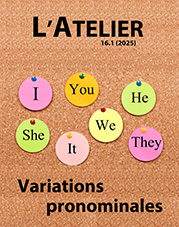Une « pronounance » amérindienne ? Les enjeux des pronoms dans les premières autobiographies amérindiennes
Résumé
Cet article s’intéresse aux enjeux narratifs et identitaires que revêt l’utilisation des pronoms personnels (je, moi, vous, il/elle, nous, vous, eux…) dans des autobiographies écrites par des Amérindiens aux XVIIIe et XIXe siècles. Que disent-ils de l’auteur, de son identité et de sa place au sein de la société coloniale ? Un même pronom a-t-il la même valeur d’un auteur à l’autre ? Les pronoms ont-ils une importance particulière du fait d’apparaître dans des récits autobiographiques ? Quelles perspectives originales apportent-ils sur la place des peuples autochtones dans la société anglo-américaine dominante ? Participent-ils de la création d’une littérature de « survivance » au sein d’une littérature de « dominance », pour utiliser des termes de l’auteur ojibwa/anishinabe Gerald Vizenor ? Ces « postures pronominales » seront plus précisément étudiées au prisme de la notion de « pronounance » avancée par Vizenor pour montrer que les pronoms permettent de « prononcer » une souveraineté narrative spécifiquement amérindienne, y compris par le biais de l’anglais.
Mots-clés : autobiographie, Amérindiens, pronounance, Vizenor, identité
Téléchargements
Publiée
Numéro
Rubrique
Licence
-
L’envoi spontané d’un article à la rédaction de L’Atelier implique l’autorisation de publication et la cession des droits dans les limites établies par la loi de propriété intellectuelle.
-
L’Atelier conserve les droits de reproduction des articles publiés, quelque soit le support : internet, CD ROM, réimpression, photocopie, etc.
-
L’auteur conserve le droit de publier ultérieurement son article déjà paru dans L’Atelier avec la seule obligation de mentionner le nom de la revue comme source de la première publication.


